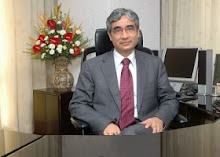By Ganesh Chella
Dr Udai Pareek, 1925-2010
About 35 years ago in 1975, two scholarly gentlemen undertook a consulting assignment to review L&T's performance appraisal system.
The outcome of the assignment was historic because it resulted in the formation of the country's first formal HRD department at L&T.
The two gentlemen were Dr Udai Pareek and Dr T. V. Rao. If you have attended and benefited from a Human Process Laboratory (T-Group) conducted by ISABS (Indian Society for Applied Behavioural Science), one of the persons you should be thankful to is Dr Pareek, because he was one of its founding members.
If you are a facilitator and have looked for tools and instruments in human relations and OD training, there is a good chance that you might have found many designed by Dr Pareek.
If you were ever looking for a framework to improve the role effectiveness of employees, you could not have missed Dr Pareek's landmark book Making Organisational Roles Effective.
Dr Pareek, fondly called Udai by those of us who have had the good fortune of knowing him and aptly called the father of the HRD and OD movement in India, passed away on March 21, 2010.
Dr Pareek was the Chairman of EMPI's Udai Pareek HR LABS and distinguished Visiting Professor at the Indian Institute of Health Management & Research, Jaipur.
He was the former Senior L&T Professor at the Indian Institute of Management, Ahmedabad, and the only Asian to become a Fellow of the National Training Laboratories (NTL), USA.
He was Chief Editor of the Journal of Health Management and a Consulting Editor of the Journal of Applied Behavioural Science.
He was also the first editor of Vikalpa and has been on the editorial boards of Administration Science Quarterly, Organization and Group Studies, Psychologia and so on.
Dr Pareek authored and edited about 30 books and over 360 papers and was awarded several national and international awards.
In this article, I would like to celebrate the work and wisdom of Udai by presenting one of my favourites - Udai's work on Role Efficacy.
Have you ever wondered why some employees in your organisation feel alienated or distanced from what they do, believe that what they are doing is unimportant or do not know what is expected of them?
Dr Pareek's Making Organisational Roles Effective provides a definitive insight into the causes for this as well as a very actionoriented framework to address these issues.
In this book, Udai defines a role as the position one occupies in a social system as defined by the functions one performs in response to the expectations of the `significant' members of a social system, and one's own expectations from the position or office.
Tracing the history of job design and work reorganisation, Udai argues that the concept of a role is much larger and wider than a job.
While he sees a role as integrating the individual with the organisation, he sees a job as somewhat prescriptive.
Similarly, he saw role effectiveness as much more holistic and comprehensive than job redesign and work reorganisation.
This wider implication of role effectiveness becomes evident from the comprehensive manner in which Udai defines role stress and role efficacy in his book.
He has listed 10 major reasons for role conflict and stress: Self-role distance, role stagnation, inter-role distance, role ambiguity, role expectation conflict, role overload, role erosion, resource inadequacy, personal inadequacy and role isolation.
What is remarkable is that Udai was not satisfied with merely suggesting an idea. He was concerned about application and solutions.
He, therefore, offered the Organisational Role Stress Scale (ORS Scale) which helps measure role stresses.
Having defined role stress and helped measure it, Udai goes on to define and explain role efficacy.
He defines role efficacy as the potential effectiveness of a role or the psychological factors underlying role effectiveness. He has outlined 10 aspects of role efficacy arranged under three dimensions.
ROLE-MAKING
Udai describes role-making as a role-holder's active attitude towards the role as evidenced by the effort and initiative taken to go beyond the brief and make the role that one likes and believes in. He sees it as different from role-taking which is a much more passive attitude of merely responding to others' expectations.
He saw role-making as a function of four aspects: self-role integration, pro-activity, creativity and confrontation.
Udai saw the self and role integrating when a person occupied a role that provided him with the opportunity to use his special strengths and skills.
ROLE CENTRING
While the first dimension focuses on the individual, the second dimension focuses on the job design aspects.
He saw role centring as a function of three aspects: centrality, influence and personal growth. The concept of centrality is very interesting.
Udai shares the example of how helping the gatekeeper of a hospital made him feel more central and enhanced his motivation.
The famed story of the doorman at the Marriot hotel is a clear validation of Udai's insight into this aspect of efficacy.
ROLE LINKING
This dimension of efficacy focuses on how the role integrates into others' roles and with the larger purpose of the organisation. He saw role linking as a function of three aspects: inter-role linkage, helping relationship and super-ordination.
Udai goes on to offer two specific tools to measure role efficacy - Essay on my Role (EMR) and the famous Role Efficacy Scale (OR).
These two tools help practitioners measure and enhance role efficacy. That Udai chose to put all of his intellectual property into the book and share it freely with his readers is a small but significant part of Udai Pareek's greatness.
May we all continue to benefit from his ideas for that was his wish.
The writer is the founder and CEO of totus consulting, a strategic HR consulting firm. He is also the co-founder of CFI, an integrated education, certification and consulting organisation for executive coaching. He can be reached at ganesh@totusconsulting.com
courtesy: The Hindu Business Line






No comments:
Post a Comment